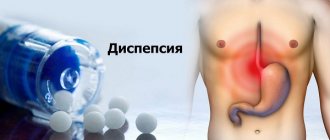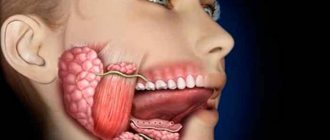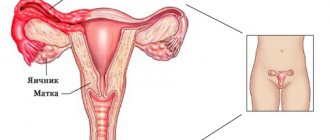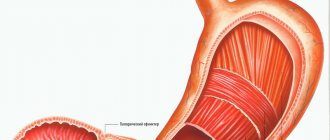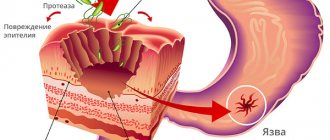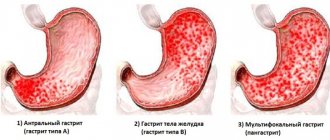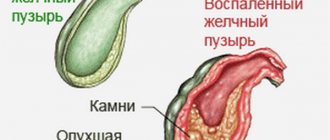Inflammation of the gastric mucosa
Doctors call inflammation of the stomach lining gastritis. Inflammation of the gastric mucosa is associated with its irritation or infection; it is characterized by redness, swelling, bleeding and scar tissue formation. There are acute and chronic gastritis. Chronic gastritis often occurs in elderly people and in patients with pernicious anemia. In chronic gastritis, all layers of the gastric mucosa are affected. Gastritis can develop in people of any age.
With inflammation of the stomach, to be precise, we are dealing with the inflammatory process of its mucous membrane
Acute inflammation of the gastric mucosa develops for various reasons, including:
- irritating foods (such as pepper or alcohol);
- medications: aspirin (in large doses), caffeine, corticosteroids, antimetabolics, butazolidin and indocin;
- ingestion of corrosive substances and poisons (for example, DDT, ammonia, mercury and carbon tetrachloride) into the stomach;
- bacterial infection;
- other acute illnesses, serious injuries, burns, severe infectious diseases or surgical operations.
Acute gastritis is manifested by many symptoms: discomfort in the stomach, indigestion, spasmodic pain in the stomach, loss of appetite, nausea, vomiting (vomiting may be with blood). Symptoms usually last from several hours to several days.
Chronic inflammation of the gastric mucosa may present with similar symptoms or only mild discomfort. Other symptoms are mild, such as intolerance to spicy or fatty foods, or mild pain that disappears after eating. Inflammation caused by bacteria is treated with antibiotics; poisons that enter the stomach are neutralized with an appropriate antidote.
Chronic inflammation of the stomach lining can be relieved simply by avoiding aspirin and spicy foods.
You can relieve chronic inflammation of the stomach lining by simply avoiding aspirin and spicy foods. If symptoms intensify or persist, it is useful for the patient to take antacids. If the cause of chronic gastritis is another serious disease, drug therapy will help relieve the symptoms, but complete recovery is difficult to achieve.
If you have inflammation of the stomach lining (gastritis), use the following recommendations:
- make some changes to your diet, avoid foods that upset your stomach;
- eat more often, but in small portions;
- take antacids and other medications prescribed by your doctor; Avoid medications that contain aspirin;
- If you lose your appetite due to nausea or pain, ask your doctor to prescribe a pain reliever or antiemetic;
- avoid alcohol, caffeine and smoking;
- If nausea and vomiting become more frequent, tell your doctor.
Chronic inflammation of the gastric mucosa can be associated with factors such as bile and other acids entering the stomach, bacterial infection, anemia, kidney disease, diabetes, irritants: drugs, alcohol, smoking, chemicals.
https://youtu.be/8aPwBbFSM1U
Causes
Inflammatory processes in the intestines arise as a result of various causes, divided into several groups:
- Infections: inflammation occurs as a result of various bacteria entering the intestines - salmonella, shigella, E. coli; viruses, as well as protozoa;
- Parasites;
- Processes of the autoimmune type: this is a special situation in which the immune system sees the cells of the intestinal mucosa as foreign and begins to produce antibodies to fight against them, resulting in inflammation;
- Genetic predisposition: some intestinal diseases and congenital enzyme deficiencies can be inherited;
- Non-compliance with the diet: excessive consumption of smoked, salty, fatty foods, overeating can cause inflammation of any part of the gastrointestinal tract, in particular the small intestine and duodenum;
- Inadequate blood supply to the vessels passing through the intestinal walls as a result of atherosclerotic changes and thinning of the artery bed;
- Changes in healthy microflora: inflammation of the intestinal mucosa occurs due to the dominance of pathogenic flora.
There are many different causes of intestinal diseases. In most cases, their development is influenced by several factors at once, which complicates the course of the disease and its subsequent treatment. The most common cause is poor nutrition. Spicy, fatty, salty, smoked foods, an abundance of sugar, fat and additives lead to digestive disorders. Other causes of disease include:
- genetic predisposition;
- frequent stress;
- pregnancy;
- bacterial and viral intestinal infections;
- parasitic infestations;
- inactive lifestyle, which worsens peristalsis;
- bad habits such as smoking, alcohol abuse, drugs;
- taking medications – the intestinal canal is negatively affected by long-term treatment with antibiotics, which also kill healthy microflora.
The first signs of inflammation of the gastric mucosa
https://youtu.be/qDICE1dp0HU
With inflammation of the stomach, to be precise, we are dealing with the inflammatory process of its mucous membrane. This phenomenon most often occurs as a result of eating too much food, consisting of indigestible foods, drinking large quantities of cold drinks, excessive consumption of alcohol and nicotine, a reaction to medications (especially salicylic and antibiotics), as well as eating spoiled or repeatedly heated food. dishes.
The first signs of inflammation of the gastric mucosa are heartburn, nausea, loss of appetite and pain in the upper abdomen, which can become spasmodic. Sometimes side effects may occur - mild fever and diarrhea. The best way out in this situation is to go on a light diet for a few days and completely abstain from drinking alcohol and nicotine to give the digestive tract a rest.
The first signs of inflammation of the gastric mucosa are heartburn, nausea, loss of appetite and pain in the upper abdomen
It is also very important to know which foods increase acidity in order to completely eliminate them from your diet, because high acidity is nothing more than the first sign of almost all stomach diseases. In this case, it is also important to understand that you have inflammation, so a visit to the doctor is simply necessary. By trying to muffle the symptoms of the disease, we only make the situation worse.
Acute inflammation of the gastric mucosa can quickly become chronic. The signs of the disease are the same, but the causes of chronic inflammation of the gastric mucosa can be: irregular diet or habit of eating hastily, poor chewing of food, constant abuse of alcohol and nicotine, poisoning, chronic vitamin deficiency, metabolic diseases, chronic weakening of the heart muscle or disorders in the production of gastric juice - increased or decreased acidity.
If you have already been diagnosed with chronic inflammation of the gastric mucosa, then you must slowly, carefully chew your food, and divide the total amount of food into five small meals. A particularly successful way to treat chronic inflammation of the stomach and high acidity are the so-called reverse procedures: the patient in the morning on an empty stomach drinks a glass of water with dissolved Carlsbad salt and lies down on his back for five minutes, then turns and lies on his stomach and on each side for five minutes.
Diagnostic methods
To make an accurate diagnosis, you should consult a doctor who will conduct the necessary studies. A specialist will be able to identify more serious pathologies and diagnose irritable stomach syndrome.
Survey methods include the following:
- Radiography. It is this study that allows you to visualize the volume of juice present in the stomach.
- Acidity analysis. To do this, a probe is inserted into the person’s oral cavity, with which the measurement is taken. The doctor selects several places, which allows you to get more accurate results. In addition, this method helps to measure basal temperature and estimate the rate of acid synthesis.
- Research through stimulants. Thanks to the use of special means, it is possible to activate juice synthesis. This allows you to assess the acidity of the stomach on an empty stomach and after eating.
- Fibrogastroduodenoscopy. This study helps to assess the condition of the mucous membrane of the digestive organs - the stomach, as well as the duodenum.
- Ultrasound. Thanks to this, it is possible to detect disturbances in the functioning of the pancreas and other organs.
Inflammation of the gastric mucosa symptoms
Inflammation of the stomach or gastritis is a disease that manifests itself in the form of inflammation of the gastric mucosa. Modern medicine in this concept unites a whole group of chronic and acute diseases of the stomach, which today are considered one of the most common problems of the digestive system.
There are two forms of the disease chronic gastritis; acute gastritis. The acute form often forms after any aggressive effect on the gastric mucosa. Chronic gastritis differs from acute gastritis in its long course.
Acute gastritis is manifested primarily by severe pain localized in the upper abdomen. This pain is often accompanied by loose stools, bloating, as well as nausea and vomiting. These signs of gastritis disappear after proper treatment. Chronic gastritis, like acute gastritis, manifests itself in the form of painful symptoms, but the nature of the pain is different.
The chronic form is characterized by an aching or pressing form of pain. Unpleasant sensations can occur after eating and on an empty stomach. In some cases, patients note other unpleasant symptoms, such as: loss of appetite, nausea and vomiting, belching, unpleasant taste in the mouth, etc. metallic taste in the mouth.
It is also worth noting that the chronic form can occur completely unnoticed by the patient. The absence of any symptoms and normal appetite is not a guarantee that there is no disease at all. Remaining invisible for several years, gastritis slowly destroys the glands of the stomach.
Prevention
Preventing a disease is cheaper than treating it. Therefore, you should adhere to the rules of a healthy lifestyle, exercise, and avoid overcooling. In the case of gastritis, strictly follow a diet and change your eating habits: do not snack on the street or in fast food cafes. Smoking has a bad effect on the gastric mucosa; it is a direct path to peptic ulcers, as does alcohol. A harmless can of beer often contains chemical additives that are extremely harmful for diagnosis.
https://youtu.be/3lWZ-4_rXtE
If a person is faced with an illness, there is nothing unusual about it. The World Health Organization published a report in which it stated that there are no healthy people on Earth; everyone is susceptible to disease to one degree or another. Therefore, you don’t need to consider yourself an exception, you just need to live with it, like others live. After all, stress is an additional factor in the development of gastric disease.
Treatment of the inflammatory process of the gastric mucosa
Treatment for inflammation of the stomach is prescribed by a gastroenterologist; it should be aimed at eliminating the provoking factor. In case of increased acidity of the stomach, antisecretory drugs are prescribed to bring the acid-base balance back to normal. Symptomatic use of antacids is possible.
However, you should not exceed the permissible doses: due to the aluminum and calcium content in their composition, antacids can cause constipation. If pain is the result of overusing junk food and alcohol, you should exclude them from your diet. Proper nutrition and avoidance of alcohol-containing and carbonated drinks will help the stomach restore the mucous membrane.
If prescribed by a doctor, in case of exacerbation of gastritis, the following may be added to treatment:
- adsorbents (activated carbon, sucralfate, alum, diosmectite);
- antiseptics (bismuth subsalicylate);
- antibiotics (in the presence of Helicobacter pylori infection);
- antihistamines, etc.
If pain in the stomach area is caused by the use of medications, you should definitely consult with your doctor about the possibility of changing therapy. Diet in the treatment of inflammation of the stomach is important, but not the main one.
Treatment for inflammation of the stomach is prescribed by a gastroenterologist; it should be aimed at eliminating the provoking factor
Much attention is paid to maintaining a diet - meals should be frequent, fractional - in small portions, 5-6 times a day. You should limit the consumption of coarse, spicy, smoked foods, avoid eating very hot or very cold foods, and chew food thoroughly.
Traditional methods of treating inflammation of the gastric mucosa
But not everyone can afford treatment with medications, which can be very expensive or may not be available for sale. A logical question arises: how to treat this disease? And here treatment with folk remedies comes to the rescue.
Many people recommend using wormwood for treatment. One of the recipes says: you need to brew a crushed mixture of wormwood, calamus and caraway seeds in a glass with one tablespoon using boiling water, simmer in a water bath for 15 minutes, then strain. After this, add boiled water until the glass is completely filled. Take one tablespoon 30 minutes before meals.
For high acidity, herbs such as chamomile or yarrow, as well as plantain, are optimal. Brew a mixture of these herbs with the addition of calendula in the amount of one glass per 1 tablespoon of decoction, keep covered for two hours, strain. Fill the container with boiled water until it is completely full. This decoction is taken in the amount of one third of a glass 30 minutes before meals.
Diagnostic procedures
A gastroenterologist cannot give a final diagnosis until certain procedures are completed. He makes his verdict based on the results of tests and medical examinations. Most often, if during the initial examination he reveals suspicions of gastritis, then the following stages of diagnosis may be:
Ultrasound;
- take readings of acidity level;
- stool examination for the presence of blood;
- swallowing a probe to visualize swelling or inflammation;
- gastroscopy to determine the presence of inflammatory bacteria in the body.
The most difficult procedure for the patient is probing , as it is associated with psychological and physiological difficulties.
Nevertheless, this is one of the most important stages of diagnosis, without which it is impossible to accurately identify the stage of development of the disease.
Chronic inflammation of the gastric mucosa
Chronic inflammation of the gastric mucosa (diffuse or focal), accompanied by impaired physiological regeneration of the epithelium, its atrophy, functional insufficiency of the stomach, disorder of the secretory, motor and often endocrine functions of the stomach.
The causes of chronic gastric mucosa are infection with Helicobacter pylori; the possibility of both direct and indirect damage to the gastric mucosa by this microorganism has been proven. Uncontrolled use of non-steroidal anti-inflammatory drugs (inhibit the production of protective factors in the gastric mucosa), smoking, chronic diseases of the digestive system, metabolic disorders, long-term systematic violations of the diet and diet.
Chronic gastritis with normal or increased secretion is usually observed in young and middle-aged people.
Chronic gastritis with normal or increased secretion is usually observed in young and middle-aged people
Heartburn, sour belching, sometimes vomiting, a feeling of pressure, burning or fullness, pain in the epigastric region occur. When the antrum is damaged, night and hunger pains occur. Exacerbations are usually associated with errors in diet and intake of alcoholic beverages. When erosions form, gastric bleeding is possible.
Chronic gastritis with secretory insufficiency, as a rule, occurs in elderly people and is characterized by a predominance of atrophic changes in the gastric mucosa. There are: an unpleasant taste in the mouth, nausea, a feeling of fullness in the epigastric region, a tendency to diarrhea. The pain is mild and, as a rule, is associated with the involvement of the small intestine, gallbladder and pancreas in the pathological process.
Weight loss, polyhypovitaminosis (loose and bleeding gums, jams, thickening and redness of the tongue, smoothness of the papillae, teeth marks on the tongue, etc.) are noted. Iron deficiency anemia and food allergies often develop. In the future, chronic atrophic gastritis can be complicated by polypous growths of the gastric mucosa.
The diagnosis of chronic gastritis is based on the clinical picture, the results of a study of gastric secretion, endoscopic and x-ray data, and biopsy. The treatment is complex, carried out on an outpatient basis, and in case of severe symptoms - in a hospital.
Major intestinal diseases
This organ is several meters long. For this reason, there are many diseases that can affect any part of the intestine. General list of ailments and the name of the intestine affected by the pathological process:
- sigmoiditis - sigmoid;
- proctitis – straight;
- enteritis – thin;
- colitis - colon;
- appendicitis - appendix;
- jeunit – skinny;
- duodenitis – thin and duodenum;
- ileitis - ileum;
- tiphlit – blind.
The most common diseases of the small intestine are enteritis, duodenitis and adhesive disease. Tumors can form here, just like in the large intestine. Any part of the organ is affected by Crohn's disease. Diseases of the large intestine are more numerous:
- dyskinesia;
- dysbacteriosis;
- haemorrhoids;
- diverticulosis;
- irritable bowel syndrome;
- obstruction;
- ulcerative colitis.
Diseases of the intestinal canal have another classification based on the etiology of the disease. According to this criterion, medicinal, toxic, traumatic, radiological, congenital and other pathologies are distinguished. The more common ones are:
- Infectious diseases. This group includes amoebiasis, tuberculosis, syphilis and dysentery.
- Parasitic diseases. These include hookworm, intestinal myiasis, scarabiasis, trichinosis, ascariasis, enterobiasis.
- Hereditary pathologies. Associated with congenital insufficiency of one or another part of the intestinal canal.
Intestinal inflammation is a collective concept of a pathological process leading to impaired digestion and peristalsis. Often, patients are diagnosed with serious complications that have already developed, affecting the functioning of almost all human life systems. To carry out adequate drug treatment, the localization of inflammatory foci is important:
- in the large intestine - colitis;
- in the small intestine - enteritis;
- in the thin and thick sections - enterocolitis.
In the vast majority of cases, the cause of intestinal inflammation in children and adults is pathogenic bacteria. Therefore, treatment usually begins with a course of antibiotics and antimicrobials. Gastroenterologists also include in therapeutic regimens drugs that have a diverse positive effect on the digestive system:
- cleansing the gastrointestinal tract of waste and toxins;
- relief of the inflammatory process;
- destruction of pathogenic bacteria, viruses, yeasts, protozoa;
- restoration of intestinal microflora;
- reduction in the severity of symptoms.
During therapy, the patient is contraindicated in physical activity. After you feel better, you can gradually increase your physical activity: walk in the fresh air, do physical therapy and gymnastics.
How does gastritis (inflammation of the stomach lining) manifest?
Symptoms of gastritis or inflammation of the gastric mucosa depend on the specific form of the disease. If inflammation occurs for the first time, then we are talking about acute gastritis, which in turn is divided into: catarrhal (simple); erosive; corrosive; fibrinous; purulent.
The easiest type of gastritis to occur is simple gastritis. The first signs of the disease include moderate pain in the upper abdomen - approximately at the level where the ribs join, under the xiphoid process of the sternum. Discomfort and unpleasant sensations occur 6-12 hours after the onset of exposure to the irritating factor and may be accompanied by nausea, sour belching and an unpleasant taste in the mouth, bloating, diarrhea and severe loss of appetite.
If the patient opens his mouth in front of a mirror, he will notice that the surface of his tongue has acquired a grayish coating. Occasionally, acute catarrhal gastritis may be accompanied by a slight increase in temperature.
Symptoms of gastritis or inflammation of the gastric mucosa depend on the specific form of the disease.
Severe hyperthermia (up to 39-40°C) is characteristic of other types of inflammation of the stomach, in particular, corrosive and purulent. In addition, gastritis of these forms is accompanied by severe pain in the stomach, vomiting (often mixed with blood or pus) and symptoms of general intoxication (headache, weakness, dehydration).
Chronic gastritis worsens from time to time due to irritating factors - drinking alcohol, smoking, eating junk food. And it is necessarily accompanied by characteristic painful sensations in the epigastric region. Pain in the chronic form of the disease usually occurs after eating. As a rule, it is of a moderate aching nature, but if the inflammation is severe, then the pain in the upper abdomen can be quite intense.
Chronic gastritis is divided into hyperacid, normacid and hypoacid - depending on how the secretion of gastric juice changes. With low and normal acidity, the patient experiences symptoms already described earlier, and with increased acidity, the course of the disease is somewhat different. For example, hyperacid gastritis is more characterized by pain that occurs before eating, that is, on an empty stomach. This is due to the aggressive effect of hydrochloric acid on the organ mucosa.
As a rule, after eating, the discomfort goes away or at least significantly decreases. Gastritis has such a manifestation of the disease, but ulcers also have symptoms of “hunger” pain among their characteristic symptoms. The appearance of a similar feeling during gastritis indicates that the gastric mucosa is severely irritated. It should be borne in mind that it is gastritis with high acidity that most often leads to the formation of ulcers on the walls of the organ.
Diet food
Proper nutrition is the key to a speedy recovery. You need to eat only healthy food, in small portions, but several times a day. You will have to give up fried, smoked, sour and spicy foods. Fatty soups, frequent consumption of coffee and strong black tea are also prohibited.
A prerequisite for the diet is the consumption of foods enriched with fiber. These include fermented milk products, vegetable fats and protein foods.
Finally, all food should be chewed slowly and very thoroughly to facilitate digestion.
The prognosis for the development of gastritis largely depends on the patient. If he follows all the instructions received from the doctor, he can count on a speedy recovery. Ignoring the problem leads to situations requiring surgical intervention.

